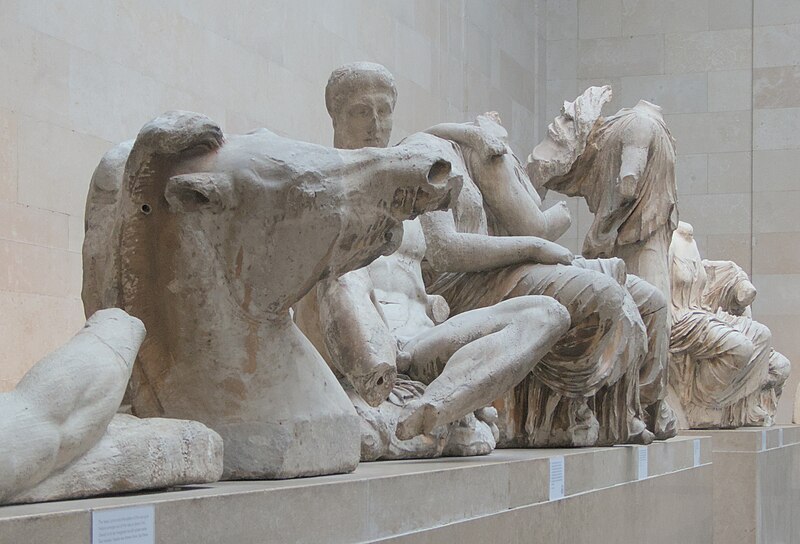
A diplomatic row has broken out between the British and Greek governments over the Parthenon Sculptures, commonly known as the Elgin Marbles. Greek Prime Minister, Kyriakos Mitsotakis was recently due to meet Rishi Sunak at 10 Downing Street. However, due to the last-minute cancellation on Sunak’s behalf, shortly before the meeting was due to take place, Mitsotakis has been left feeling “deeply disappointed by the abrupt cancellation” and has also rejected the suggestion of a re-arranged time for the meeting. The cancellation came after Mitsotakis raised the topic of the contested Elgin Marbles in an interview with Laura Kuenssberg, arguing that the British Museum should return them to Greece.
Mitsotakis has been left feeling “deeply disappointed by the abrupt cancellation”
The Elgin Marbles are part of a frieze that decorated the ancient Parthenon temple at the Acropolis in Athens, Greece. They are seen as symbols of freedom in Greece and were controversially removed from the country by a British diplomat in 1801, igniting a debate which has lasted more than two centuries.
In Britain, the sculptures are referred to as the ‘Elgin Marbles’ after Lord Elgin who removed them from the Parthenon temple in the early 19th century. During this time, he was the ambassador to the Ottoman Empire which ruled Greece. Nothing has been found to support Lord Elgin’s statements made in 1801 where he declared that he had been given direct permission from the Ottoman Empire to remove the sculptures. In 1816, he sold the sculptures to the UK government before they were passed on to the British Museum.
In 1832, Greece gained its independence from the Ottoman Empire and this is where the controversy can be traced back to, as the country began attempts to recover the sculptures as well as other artworks which had been taken. The Elgin Marbles have also made news linked to popular culture as in 2014, human rights barrister and wife of George Clooney, Amal Clooney, called on Britain to start talks with Greece about their safe return. Clooney said: “This is an injustice that has persisted for too long and in a world of intractable conflicts.”
“This is an injustice that has persisted for too long and in a world of intractable conflicts.”
Amal Clooney
Both Rishi Sunak and Labour leader, Sir Keir Starmer say that they would not support a change to the British Museum Act that currently prevents their return. The museum says that it continues to have constructive conversations about their possible return. In 2022, there were calls to make it easier for UK museums to return artefacts to their countries of origin- these calls were rejected by the UK government. Furthermore, in 2021, Boris Johnson told the Greek premier that the issue over the sculptures was one for the trustees of the British Museum to deal with. The Greek government’s desire for the sculpture’s return is so strong that their government has offered several other cultural artefacts in exchange.
In terms of the general public, people are divided. There are arguments in favour of and against the continued presentation of the Elgin Marbles in London. For example, retired publisher, Juliane Jolie says that she has changed her mind regarding where the sculptures should be homed.
“I’ve gone from thinking they absolutely should go back to thinking as time goes on that they shouldn’t … If you asked me 18 months ago I would have said yes but, then, when does it stop? The whole point of a museum is preservation for the future … It’s good to see some Greek culture in London. Not everyone can go all the way to Greece.”
In contrast to this, Greek art historian, Maria Paloma de Alvarado has said that, “I believe yes, they should be returned. While they bought it legally, it’s part of the Greek identity.”
The public debate often comes down to legality vs morality.
Evidently, Rishi Sunak is against the idea of returning the marbles. Labour leader Keir Starmer met with Mitsotakis on Monday and a source close to Starmer said that if he were to win the next election, he would unlikely change the law.
Despite this, Chair of the British Museum, George Osborne, is understood to have drawn up an agreement with Athens. The current law prevents treasures being legally given away by the museum but Osborne is seeking to repatriate the antiquities as part of a “cultural exchange.” This deal, if finalised, is not expected to end the long-term dispute over the Elgin Marbles.
The British government and the British Museum are very much under the spotlight to act in the light of the recent return of the Benin Bronzes from Germany to Nigeria last December. These artefacts were looted by British soldiers from the former west African kingdom of Benin 125 years ago and then sold to German museums in Berlin, Hamburg, Stuttgart and Cologne.
The UK appears to be showing more reluctance in following suit and it is not yet known whether this compromise short-term loans of the Elgin Marbles back to Greece can eventually become a permanent return.


